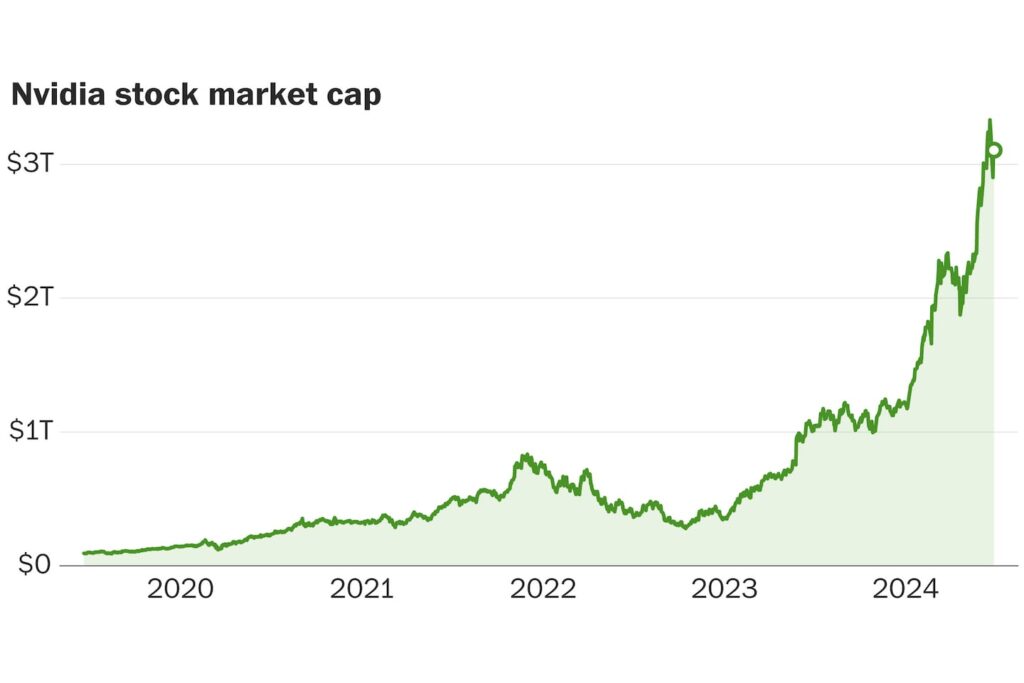Chipmaker Nvidia surpassed Microsoft as the world's most valuable company for the first time this month, with a market capitalization of $3.3 trillion. Though its reign was short, it symbolized the rapid growth of a company that was little known outside the tech industry just two years ago.
For the first three decades, Nvidia was a niche company making computer chips primarily for video games, but its central position in the artificial intelligence boom has led to impressive growth.
Nvidia sells graphic processing units (GPUs) and software that are essential for training and running the AI algorithms that power chatbots and image generators.
Learn how Nvidia became one of the world's most valuable companies.
Date: January 22, 1999 Market Cap: Under $1 billion
Nvidia went public in January 1999 at $12 a share, six years after it was founded and a year before the dot-com bubble collapsed, wiping out much of the market capitalization of the burgeoning internet industry. The company built a reputation as making the best chips for video games and, in 2001, won a contract to supply GPUs for Microsoft's Xbox gaming console.
Date: November 4, 2021 Market Cap: $743.8 billion
Nvidia has long been traded by professional investment firms, but during the pandemic, millions of people with day jobs started investing in the stock through apps like Robinhood and online forums like WallStreetBets. Gamers turned retail investors recognized Nvidia as the company behind the improvements in video game graphics over the past two decades.
In 2021, Facebook rebranded as Meta, bringing renewed interest to the concept of the Metaverse, a future where people spend a lot of time connected to virtual worlds. NVIDIA CEO Jensen Huang jumped on the idea, saying the company's chips would power the Metaverse's future world. To showcase the technology, he spoke at NVIDIA's annual conference using a digital clone of himself.
While Meta's grand plans for the metaverse have yet to come to fruition, at the time some investors were betting that it would be the next big thing. On November 4, 2021, financial analysts at Wells Fargo published a report detailing how Nvidia was well positioned to profit from the predicted metaverse boom, sending the stock up 12%.
Date: February 22, 2023 Market Cap: $582.3 billion
At the end of 2022, OpenAI, an artificial intelligence research institute founded as a non-profit in 2015, launched ChatGPT, which was better than any chatbot the public had ever interacted with. The tech industry was fascinated, and within months, Microsoft had invested billions of dollars in OpenAI. The AI arms race was on.
Nvidia's chips and software are essential for building the “large-scale language models” that form the underlying technology for image generators like ChatGPT and OpenAI's Dall-E 3, which is due to be launched in 2023.
Huang told investors on Feb. 22, 2023, that the company was positioned to benefit from the rapidly gaining AI boom. Wall Street was convinced, and the company's shares soared 14%, giving the company a market capitalization of $582.3 billion.
Pickaxes and shovels for the AI Gold Rush
Date: May 24, 2023 Market Cap: $1 Trillion
NVIDIA's stock price continued to rise. In May 2023, NVIDIA reported revenue in real numbers for the first time, showing the company as the biggest beneficiary of the AI boom. The stock price rose 25%, and the company's valuation briefly exceeded $1 trillion, making it one of the few companies to reach that level.
As the company reported growing sales, more investors flocked in, sending its stock price soaring to $1.2 trillion in a year. Because many AI startups and companies, including OpenAI, are private, the public had few options to invest in the AI boom. Many bought Nvidia stock.
Big Tech Companies Spending Even Bigger
Date: May 22, 2024 Market Cap: $2.6 Trillion
In the first quarter of 2024, Nvidia's revenue rose to $26 billion, up from just $7.2 billion in the same period last year.
AI startups, companies looking to incorporate AI into their products, and venture capital firms are all clamoring to get their hands on Nvidia's chips, sending prices soaring, but the biggest buyers are the big tech companies — Microsoft, Amazon, Meta and Google — who need the chips to build and train their own AI models.
Earlier this year, Microsoft, Meta and Google told investors they would be increasing their spending on AI — Google alone plans to spend at least $12 billion every four months this year — and much of that money will go directly into Nvidia's coffers.



